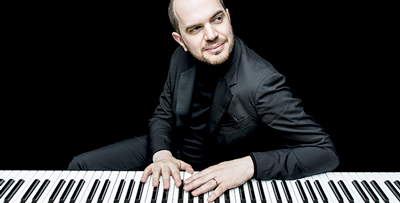by Daniel Hathaway

Gershwin’s Rhapsody reverted to the original big band orchestration by Ferde Grofé that supported the composer’s sometimes improvised solo part at its premiere on February 12, 1924. Ears used to Grofé’s later symphonic orchestrations must have been surprised at the brash freshness of the earlier version. Light on strings (four violins and bass), reedy with saxophones (three, plus various clarinets), replete with brass (including tuba), and energized by trap set (Mark Damoulakis), the ensemble seemed to signal that it was creating a new musical genre right in front of your ears. Daniel McKelway’s particularly cheeky clarinet slide at the beginning aptly set the tone.
Guest conductor James Gaffigan joined Gerstein in shaping a thoroughly anti-Romantic performance of Rhapsody, daring in its energy and captivating in its novelty. Although Gerstein played most of his solo part from the notes Gershwin eventually finished writing down — and did that with special flash and pizzazz — the pianist did contribute some striking chord progressions of his own during the long cadenza that helped add to the sensation that you were hearing the piece for the first time.
The program began with a brief suite drawn from Bernard Herrmann’s film score to Alfred Hitchcock’s Psycho. Scored for strings only, the music provides a chilling undertow to Hitchcock’s screenplay, but doesn’t work so effectively on its own. Hitchcock wanted silence during the famous shower scene, but Herrmann convinced him otherwise, and the iconic shrieking violins inspired a titter that ran through the audience on Friday.
To end the concert, Gaffigan and the Orchestra delivered a fluent, virtuosic reading of Béla Bartók’s Concerto for Orchestra, characterized by stunning brass and wind playing — especially when instruments pair up in the second movement. The magical third movement was followed by some virtuosic coughing in the audience, leading Gaffigan to mock-castigate the crowd: “There’s nothing wrong with coughing, but just get it over with!” Silence was restored, and the piece ended with more musical glories: the fourth-movement lovers’ tryst with its rude interruptions, and the swashbuckling, fugal finale. At the end, Gaffigan waded through the Orchestra, giving nearly all the players solo or sectional bows.
Continuing his brilliant playing into an After Party that had more than the usual Fridays@7 connection to the main event, Gerstein wove the story of Arnold Schoenberg’s Piano Concerto into an engaging lecture-recital that continued the theme of jazz crossing the line into the concert hall.
That concerto — which Gerstein played on Thursday and Friday evenings — had been somewhat inadvertently commissioned by the colorful Oscar Levant, who thought he was getting a short piece. Levant, a friend of Gershwin and a famous neurotic, was represented in Gerstein’s solo set by one of his popular songs, along with a Ligeti Étude and two of Earl Wild’s Seven Virtuoso Etudes on Gershwin songs. Gerstein’s playing was relaxed and dazzling, and between pieces, he displayed the talents of a born raconteur. The large audience was rapt and appreciative.
Published on ClevelandClassical.com January 10, 2017.
Click here for a printable copy of this article


